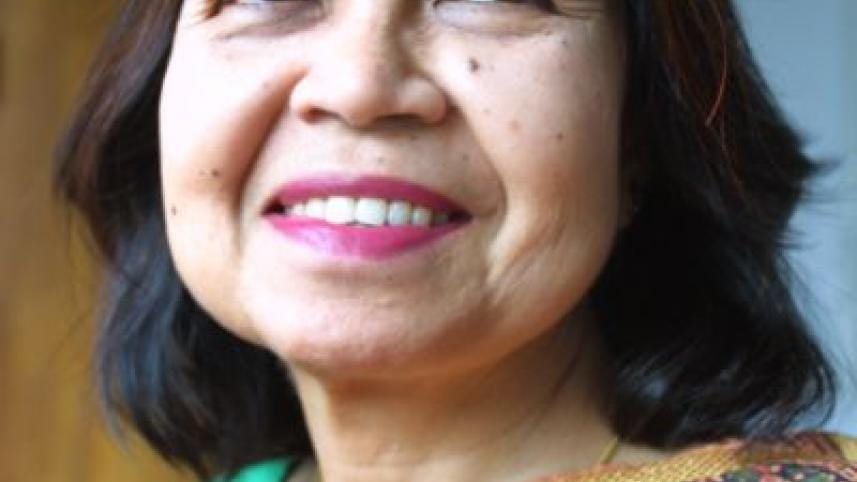'One of the best ways to tackle extremists is to ensure space for non-violent and democratic opposition'

The Daily Star (TDS): Is democracy functioning in Bangladesh?
Prof. Raunaq Jahan (RJ): Democracy has never functioned very well in Bangladesh. Though the Bangladesh constitution adopted in 1972 established democracy as one of the four guiding principles of state, within three years, in 1975, Bangladesh fell under military rule. After 15 years we succeeded in overthrowing military rule in 1990. But our renewed democratic journey has not been smooth. Since 1991, our two major electoral parties, Awami League (AL) and Bangladesh Nationalist Party (BNP), have not been able to agree on the ground rules of organising free and fair elections.
After the restoration of electoral democracy six parliamentary elections had been held, of which two -- the sixth and the tenth -- had been boycotted by either one of the two major parties. Both elections were organised by the incumbent political government but the main opposition party, AL in 1996 and BNP in 2014, refused to participate in the election on the ground that elections organised by an incumbent political government would not be free and fair. Four parliamentary elections -- the fifth, seventh, eighth and ninth -- were organised by non-party caretaker governments. All of them were recognised as free and fair by national and international observers but the losing political party or electoral alliance in all these elections termed the results as rigged and fraudulent.
Bangladesh has persistently scored low in different indicators used by international organisations to assess the quality of democracy across the world. For example, Bangladesh always scores low in establishing rule of law, yet this is a critical feature of a well functioning democracy. What is disheartening is that over the last quarter century we have not made any progress in improving the state of rule of law in the country. We cannot be a well functioning democracy unless we are able to establish the rule of law.
TDS: With neither AL nor BNP ready to compromise, what are the chances that the present political crisis will be resolved soon? What should come first: end of violence or initiation of dialogue?
RJ: So long as the two main parties remain at polar opposites and are not interested in resolving the crisis through peaceful means, we will not see a resolution any time soon. In a well functioning democracy all contested issues should be resolved through peaceful discussion and debate and not through violence or force. There is no alternative to discussion and dialogue. Unfortunately, a false dichotomy has recently been created between holding dialogues and using force. While violent and criminal activities should be addressed by use of law enforcement agencies, political demands should be addressed politically through discussion and negotiation.
TDS: What exactly will BNP gain from continuous hartals and oborodhs that have taken a huge toll of human lives, and when people are defying their programmes?
RJ: I do not find any political gains for BNP. Ordinary citizens do not like continuous hartals and oborodhs or loss of life and property as a result of the political strategy initiated by the BNP-led alliance since January 2015. Since BNP claims to be a democratic party and says that its goal is to have a free and fair election, it is politically counterproductive for them to use violence. This creates a negative image of the party.
TDS: The government says that there is no political crisis in the country, and, as it looks, it has put emphasis on the development projects. Is development alternative to democracy?
RJ: Again it is a false dichotomy to separate development and democracy. Both democracy and development need to go together. They cannot be perceived as an an alternative to each other. In the 1950s and 1960s military dictators and other autocratic rulers used to argue that development is their priority and democracy has to take a back seat. But this view is now rejected and there is a global consensus that democracy is not only a desirable goal in and of itself, it is also a precondition for sustainable development.
TDS: What are the prospects of political reforms for a qualitative change in politics? How can we reform our dysfunctional political system and consolidate the democratic institutions?
RJ: We need political leaders and political parties who are truly committed to political reforms to bring a qualitative improvement in our politics. At present, our political leaders and political parties are solely preoccupied in their zero-sum struggle for political power. They may use the rhetoric of democracy but there is a wide gap between their rhetoric and practice. Our political leaders and parties do not practice democracy within their own organisations. We cannot expect undemocratic people and institutions to act as drivers for positive change to consolidate democracy.
TDS: How do you see the recent rise of extremist groups in the country?
RJ: It is an alarming situation. After the 2008 parliamentary elections we witnessed the decline of extremist groups and we thought that the government had been able to crush or control the extremists. We were relieved. But now we realise that these forces are still alive and well and they have the capacity to do a lot of harm. One of the best ways to tackle extremists is to ensure space for non-violent and democratic opposition. This marginalises the extremists.




 For all latest news, follow The Daily Star's Google News channel.
For all latest news, follow The Daily Star's Google News channel.
Comments